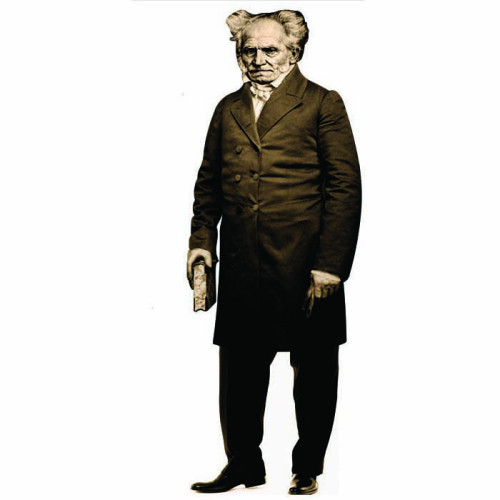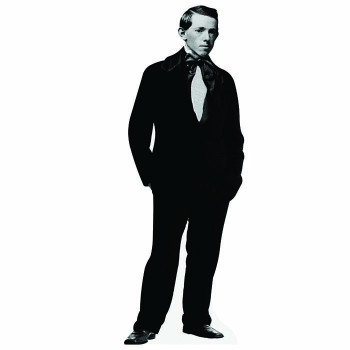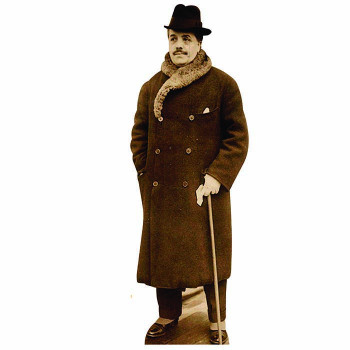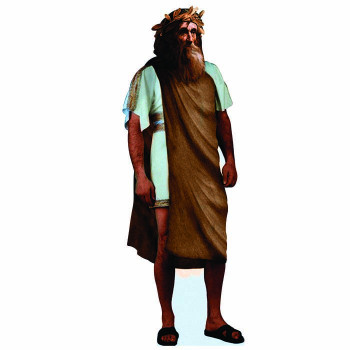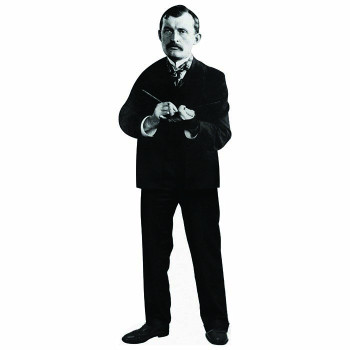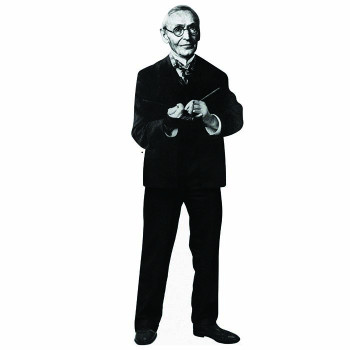ARTHUR SCHOPENHAUER CARDBOARD CUTOUT
-
$0.00
Available Options
72 x 26 inches. Our cardboard cutout of Arthur Schopenhauer. All cardboard cutouts come folded and have an easel attached to the back to be self-standing. Items are printed and produced to order. Printing and processing takes up to 5 business days plus shipping time.
Introduction to Arthur Schopenhauer
Celebrate the legacy of one of the most influential philosophers of the 19th century with our lifesize cardboard cutout of Arthur Schopenhauer. Perfect for philosophical displays, educational events, or as an inspiring addition to your home or office, this cutout captures the introspective and profound presence of Arthur Schopenhauer, reflecting his significant impact on philosophy and intellectual history.
Background of Arthur Schopenhauer
Arthur Schopenhauer was born on February 22, 1788, in Danzig (now Gdańsk, Poland). He was raised in a wealthy merchant family, which afforded him a privileged education. Schopenhauer's father, Heinrich Floris Schopenhauer, wanted him to pursue a career in commerce, but after his father's death in 1805, Arthur turned to academic studies, focusing on philosophy.
Schopenhauer studied at the University of Göttingen, where he was deeply influenced by the works of Immanuel Kant and Plato. He completed his doctoral dissertation, "On the Fourfold Root of the Principle of Sufficient Reason," in 1813 at the University of Jena. In this work, Schopenhauer explored the foundations of knowledge and the nature of reality, establishing the groundwork for his later philosophical system.
Schopenhauer's most famous work, "The World as Will and Representation" (1818), presented his central philosophical ideas. He argued that the underlying reality of the world is a blind, irrational will, and that human existence is characterized by suffering and striving. This pessimistic view of life contrasted sharply with the prevailing optimism of his contemporaries.
Despite the originality and depth of his ideas, Schopenhauer's work initially received little attention. He struggled to gain recognition in the academic world and often clashed with other prominent philosophers, such as Hegel. However, his writings began to gain a wider audience in the latter part of his life and especially after his death.
Schopenhauer lived much of his later life in Frankfurt, where he continued to write and refine his ideas. His work influenced a wide range of thinkers, including Friedrich Nietzsche, Sigmund Freud, Richard Wagner, and later existentialist and pessimist philosophers. Schopenhauer passed away on September 21, 1860, in Frankfurt.
Cultural Impact of Arthur Schopenhauer
Arthur Schopenhauer's impact on philosophy and intellectual history is profound and far-reaching. His ideas on the nature of reality, human existence, and aesthetics have left a lasting legacy and continue to influence contemporary thought.
Schopenhauer's concept of the "will" as the fundamental reality of the world was a groundbreaking departure from traditional metaphysical views. He argued that the will is an irrational, driving force that manifests in all aspects of life, leading to constant striving and suffering. This pessimistic view of existence provided a counterpoint to the optimistic philosophies of his time and laid the groundwork for existentialist and nihilist thought.
In addition to his metaphysical ideas, Schopenhauer's aesthetics have had a significant impact on the philosophy of art. He believed that art, particularly music, offers a respite from the suffering of the world by allowing individuals to experience the world as pure representation, free from the demands of the will. His ideas on aesthetics influenced composers such as Richard Wagner and continue to be relevant in contemporary discussions of art and beauty.
Schopenhauer's influence extends beyond philosophy to psychology and literature. His ideas on the unconscious will and the nature of human motivation prefigured some of the key concepts in Freudian psychoanalysis. Literary figures such as Thomas Mann and Jorge Luis Borges have also drawn inspiration from Schopenhauer's works.
Despite his initial lack of recognition, Schopenhauer's ideas gained a significant following in the late 19th and early 20th centuries. His philosophical pessimism resonated with a generation of thinkers and artists grappling with the uncertainties of modernity. Today, Schopenhauer is regarded as one of the most important figures in Western philosophy, and his works are studied and appreciated for their depth and originality.
This cutout of Arthur Schopenhauer celebrates his remarkable contributions and enduring legacy as a philosopher. It serves as a tribute to his intellectual brilliance, his impact on the development of philosophy, and his significant role in shaping the cultural heritage of the 19th century.
- Brand: Historical Cutouts
- Product Code:H79097
- Availability:In Stock
LEARN MORE ABOUT OUR AVAILABLE MATERIALS

LIFE SIZE HISTORICAL CUTOUTS
We have been the leading historical based cutout supplier for nearly 10 years. We have worked with many schools, museums, and colleges across the country to provide stunning graphics from hsitory. Historical Cutouts are available in 3 materials and come contour cut with an easel to be self standing. Click below to learn more about each material and our cutout process.
Learn More
LIFE SIZE HISTORICAL WALL DECALS
All of our historical figures are available as a life size wall decals. Vinyl wall decal orders come ready to apply with squeegie and instructions. Having trouble? Check out our how to youtube video. Our graphics are printed on tear resistant PhotoTex Vinyl using our high definition 4 color plus white printing process.
Learn More
HISTORICAL ACRYLIC CUTOUTS
Desktop Legends are a smaller version of our life size cutotus printed on 3/16th" acrylic. All of our historical cutouts are also available as a desktop legend. These acrylic statuettes come in two sizes, 8" and 12". If you would like to learn more please click below.
Learn MoreRELATED PRODUCTS
-
Palmyra Ancient Roman Theater 90x46 Inch Cardboard Cutout Standee Standup
90x46 inch cardboard cutout of the ancient theater at Palmyra. Palmyra?s remnants can be found in ce..
Van Gogh Starry Night Landscape
Size: 45" x 91"Van Gogh Starry Night Landscape; All cardboard cutouts come folded and have an easel..
George Michael Red Carpet Cardboard Cutout Standee Standup
71x24 inch cardboard cutout of George Michael, one of the most successful musicians of all time. He?..
Horatio Alger Jr Cardboard Cutout
62 x 22 inches. Our cardboard cutout of Horatio Alger Jr. All cardboard cutouts come folded and have..
Sergei Diaghilev Cardboard Cutout
72 x 25 inches. Our cardboard cutout of Sergei Diaghilev. All cardboard cutouts come folded and have..
H79525 Earnest Hemingway Whom The Bell Tolls Cardboard Cutout Standee Standup
62x37 inch cardboard cutout of the man whom the bell tolls!..
Homer Cardboard Cutout
67 x 24 inches. Our cardboard cutout of Homer. All cardboard cutouts come folded and have an easel a..
Painter Edvard Munch Cardboard Cutout
70 inches. Our cardboard cutout of Painter Edvard Munch. All cardboard cutouts come folded and have ..
Albert Camus Cardboard Cutout
72 x 28 inches. Our cardboard cutout of Albert Camus. All cardboard cutouts come folded and have an ..
John Steinbeck Cardboard Cutout
72 x 27 inches. Our cardboard cutout of John Steinbeck. All cardboard cutouts come folded and have a..
Hermann Hesse Cardboard Cutout
70 x 23 inches. Our cardboard cutout of Hermann Hesse. All cardboard cutouts come folded and have an..
Little Red Riding Hood Bow Crossbow Arrow Hunting Cardboard Cutout Standee Standup
74x34 inch cardboard cutout of little red riding hood based on a story by Charles Perrault and the B..

